-
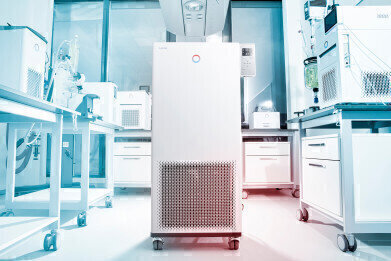 Lauda Integral process thermostats reliably heat and cool from -90 to 320°C. Thanks to their highly dynamic, precise temperature control, high connectivity and high pump output, the devices can be used in many different applications. (Image: LAUDA)
Lauda Integral process thermostats reliably heat and cool from -90 to 320°C. Thanks to their highly dynamic, precise temperature control, high connectivity and high pump output, the devices can be used in many different applications. (Image: LAUDA) -
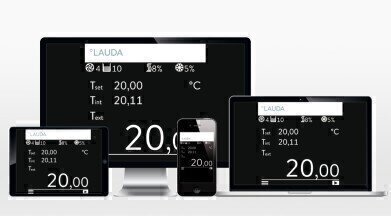 The modular interface concept allows users to integrated Integral devices seamlessly into their processes. For the first time, an integrated web server enables the thermostats to be controlled via PC or mobile devices. (Image: LAUDA)
The modular interface concept allows users to integrated Integral devices seamlessly into their processes. For the first time, an integrated web server enables the thermostats to be controlled via PC or mobile devices. (Image: LAUDA) -
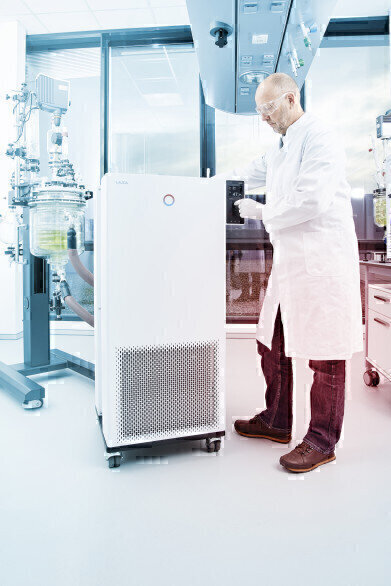 Lauda Integral process thermostats are used in a wide range of applications, like the temperature control of glass reactors in chemistry, pharmacy or biotechnology. (Image: LAUDA)
Lauda Integral process thermostats are used in a wide range of applications, like the temperature control of glass reactors in chemistry, pharmacy or biotechnology. (Image: LAUDA) -
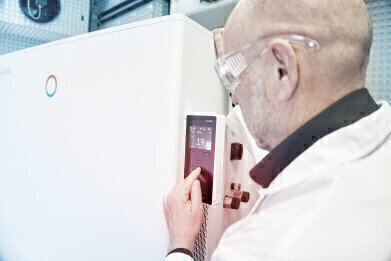 All Lauda Integral process thermostats feature a state-of-the-art TFT display directly on the device. Optionally, an intuitive operating unit with a touch display and additional functions can be connected to the device. (Image: LAUDA)
All Lauda Integral process thermostats feature a state-of-the-art TFT display directly on the device. Optionally, an intuitive operating unit with a touch display and additional functions can be connected to the device. (Image: LAUDA) -
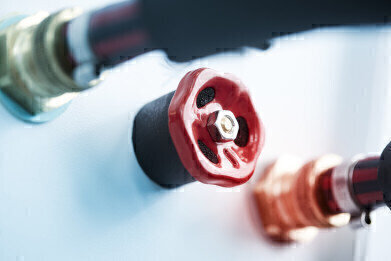 The bypass in the Integral T reduces the linear pump characteristics when it opens. Pressure-sensitive applications can therefore be protected by reducing the discharge pressure. (Image: LAUDA)
The bypass in the Integral T reduces the linear pump characteristics when it opens. Pressure-sensitive applications can therefore be protected by reducing the discharge pressure. (Image: LAUDA) -
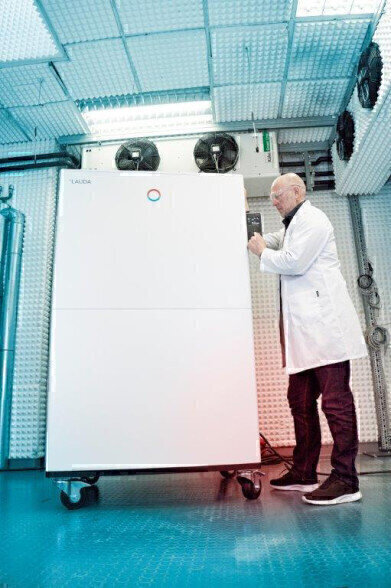 The new Lauda Integral P process thermostats expand the temperature range of non-flammable heat carriers and enable applications under realistic conditions at low operating costs. (Image: LAUDA)
The new Lauda Integral P process thermostats expand the temperature range of non-flammable heat carriers and enable applications under realistic conditions at low operating costs. (Image: LAUDA)
Laboratory Products
New Generation Integral Process Thermostats for Professional Temperature Control from -90 to 320 degrees C
Jun 10 2021
Lauda, the world market leader for constant temperature equipment and systems for precise temperature control, is steadily expanding its comprehensive portfolio. With the fully redeveloped, future-proof Lauda Integral product line, the company presents a further milestone in the field of professional temperature control. The powerful Integral process thermostats have been a permanent feature of the Lauda portfolio since the year 2000 and have become established as a reliable solution in all manner of applications and industries. Major areas of application include the temperature control of reactors in the chemical and pharmaceutical industry, temperature tests at test stations in the automotive industry, or space simulations in mechanical and electrical engineering. The company is now driving the further development of the process thermostats and bringing the models in the T and XT series into the digital age. As a result, the new generation of Integral process thermostats have a variety of new features, including a brand new, intuitive control concept using mobile devices, increased pump output and a modular, expandable interface concept.
Lauda Integral T and XT: 20 years of success
Lauda's new Integral T process thermostats ensure efficient control of external temperature control processes in the temperature range from -30 to 150°C. The devices have an adjustable heating and cooling capacity and small internal volume that enables rapid temperature changes. Thanks to the open hydraulic system, the device aerates quickly and without loss of function. This makes it ideal for temperature control processes with frequent changes in consumer or test object. Classic application areas include controlling reactions or climate simulations. A reliable, powerful submersible pump and an internal bypass to limit the pressure are part of the standard equipment of the Integral T. Recently, Lauda updated the portfolio with a new Integral T model that offers 19 kW cooling capacity.
The extremely dynamic, high-performance Lauda Integral XT process thermostats, on the other hand, operate with a cold oil blanket according to the flow principle and make it possible to use just one temperature control medium across the expanded temperature range from -90 to 320°C. Thanks to an electronically controlled, magnetically coupled, eight-level Lauda Vario pump, the flow rate can be optimally thermally set for the requirements of pressure-sensitive consumers, as well as applications with high hydraulic resistance. An internal bypass, another new standard feature of the XT models, also increases flexibility. It increases the flow rate inside the device when only low flow rates are possible externally, to optimise the temperature control process.
The latest additions to the Integral range are the new Lauda Integral P process thermostats. The two device types, Integral IN 2050 PW and IN 2560 PW, function according to the pressure blanketing principle. The devices, which are equipped with a stainless steel pressure vessel, significantly expand the temperature range of non-flammable heat carriers. For example, the upper temperature limit of water/glycol mixtures, which are commonly used in tests in the automotive industry, can be increased from 90°C to 140°C. Consequently, the new Integral P process thermostats enable testing of drive systems or stress tests under realistic conditions at low operating costs. In the pressure blanketing process, the compressed air supply is used to fill the device with negative pressure, which sucks the heat transfer liquid into the device with a vacuum of -0.2 bar. Integral P process thermostats can be used within a working temperature range from -40°C to 140°C with a cooling capacity of 20 kW and 25 kW, respectively. The devices are ideal for use in test stations for the testing of electric motors or other parts in the electric mobility sector.
Integral process thermostats - Ready for the digital future
With the new Integral devices, Lauda is driving forward the networking of temperature control technology. As the first series device in the history of Lauda, the process thermostats have an integrated web server. This allows the devices to be integrated in existing company networks and therefore monitored and controlled via PC, or with mobile devices like a tablet or smartphone, if desired. The devices can be installed and operated in separate locations, if required. This enables location-independent monitoring and control. The thermostats can also be easily controlled via a modern OLED display directly on the device.
New interface concept provides flexibility
The new Integral process thermostats enable maximum networking of user processes, thanks to their modular and future-proof interface concept. The devices feature interfaces such as Ethernet, USB and Pt 100 as standard. Further interfaces and communication protocols can easily be added via additional modules. This allows Integral thermostats to be flexibly integrated in different communication scenarios. In addition, all the three-phase devices in the Lauda Integral series are equipped for operation with a mains frequency of 50 or 60 Hz (bifrequent) - a great benefit for users who want to use their devices flexibly in different locations worldwide.
More information online
Digital Edition
Lab Asia 31.2 April 2024
April 2024
In This Edition Chromatography Articles - Approaches to troubleshooting an SPE method for the analysis of oligonucleotides (pt i) - High-precision liquid flow processes demand full fluidic c...
View all digital editions
Events
Apr 28 2024 Montreal, Quebec, Canada
May 05 2024 Seville, Spain
InformEx Zone at CPhl North America
May 07 2024 Pennsylvania, PA, USA
May 14 2024 Oklahoma City, OK, USA
May 15 2024 Birmingham, UK
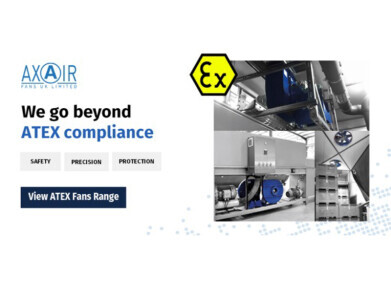
.jpg)















